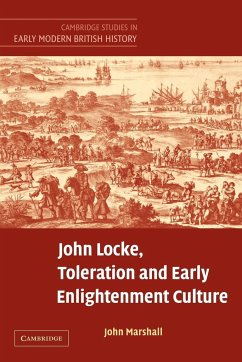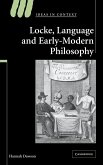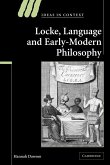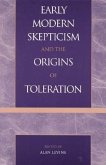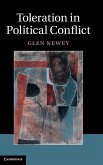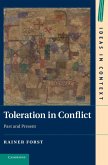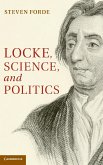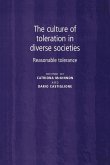- Broschiertes Buch
- Merkliste
- Auf die Merkliste
- Bewerten Bewerten
- Teilen
- Produkt teilen
- Produkterinnerung
- Produkterinnerung
Major intellectual and cultural history of intolerance and toleration in early modern Enlightenment Europe.
Andere Kunden interessierten sich auch für
![Locke, Language and Early-Modern Philosophy Locke, Language and Early-Modern Philosophy]() Hannah DawsonLocke, Language and Early-Modern Philosophy118,99 €
Hannah DawsonLocke, Language and Early-Modern Philosophy118,99 €![Locke, Language and Early-Modern Philosophy Locke, Language and Early-Modern Philosophy]() Hannah DawsonLocke, Language and Early-Modern Philosophy55,99 €
Hannah DawsonLocke, Language and Early-Modern Philosophy55,99 €![Early Modern Skepticism and the Origins of Toleration Early Modern Skepticism and the Origins of Toleration]() Alan LevineEarly Modern Skepticism and the Origins of Toleration130,99 €
Alan LevineEarly Modern Skepticism and the Origins of Toleration130,99 €![Toleration in Political Conflict Toleration in Political Conflict]() Glen NeweyToleration in Political Conflict93,99 €
Glen NeweyToleration in Political Conflict93,99 €![Toleration in Conflict Toleration in Conflict]() Rainer ForstToleration in Conflict116,99 €
Rainer ForstToleration in Conflict116,99 €![Locke, Science, and Politics Locke, Science, and Politics]() Steven FordeLocke, Science, and Politics89,99 €
Steven FordeLocke, Science, and Politics89,99 €![The culture of toleration in diverse societies The culture of toleration in diverse societies]() The culture of toleration in diverse societies27,99 €
The culture of toleration in diverse societies27,99 €-
-
-
Major intellectual and cultural history of intolerance and toleration in early modern Enlightenment Europe.
Produktdetails
- Produktdetails
- Verlag: Cambridge University Press
- Seitenzahl: 776
- Erscheinungstermin: 30. November 2009
- Englisch
- Abmessung: 229mm x 152mm x 41mm
- Gewicht: 1102g
- ISBN-13: 9780521129572
- ISBN-10: 0521129575
- Artikelnr.: 28174630
- Herstellerkennzeichnung
- Libri GmbH
- Europaallee 1
- 36244 Bad Hersfeld
- gpsr@libri.de
- Verlag: Cambridge University Press
- Seitenzahl: 776
- Erscheinungstermin: 30. November 2009
- Englisch
- Abmessung: 229mm x 152mm x 41mm
- Gewicht: 1102g
- ISBN-13: 9780521129572
- ISBN-10: 0521129575
- Artikelnr.: 28174630
- Herstellerkennzeichnung
- Libri GmbH
- Europaallee 1
- 36244 Bad Hersfeld
- gpsr@libri.de
John K. Marshall spent several months working on the English version of my book. I owe him a debt of gratitude.
Part I. Catholic and Protestant Intolerance in the Later Seventeenth
Century: 1. Catholic intolerance, its representations in England c.1678-86,
and Locke's Second Treatise; 2. Catholic intolerance and the significance
of its representations in England, Ireland, and the Netherlands c.1687-92;
3. Protestant religious intolerance in England c.1660-c.1700; 4. Religious
toleration and intolerance in the Netherlands and in the Huguenot community
in exile; Part II. Justifications of Intolerance and the Emergence of
Arguments for Toleration: Section 1: Justifications of Intolerance to
c.1660: 5. Patristic and medieval sources of early modern intolerance:
anathematising heretics and schismatics as seditious, pestilential
poisoners, 'libertines' and 'sodomites'; 6. Heresy and schism, sedition and
treason, and 'contrarities' and 'inversions' in the 'Last Days'; 7.
Catholic and 'Magisterial Reformation' attacks on Anabaptism,
Anti-Trinitarianism, and Atheism; 8. Anathematising heretics in sixteenth
and early seventeenth century French religious polemic; 9. Antiheretical
and antischismatic literature in England from the late sixteenth to the
mid-seventeenth century; Section 2: The Emergence of Tolerationist
Arguments and their Condemnation: 10. Early tolerationist arguments and
their condemnation; 11. Arguments for and against religious toleration in
the Netherlands c.1579-c.1680; 12. Toleration and intolerance, Jews and
Muslims; Section 3: Catholic and Protestant Defences of Intolerance in the
Later Seventeenth Century: 13. Catholic justifications of intolerance in
the 1680s and 1690s; 14. Huguenot justifications of intolerance and debates
over resistance in the 1680s and 1690s; 15. Justifying intolerance in
England c.1660-c.1700; Part III. The 'Early Enlightenment' Defence of
Toleration and the 'Republic of Letters' in the 1680s and 1690s: 16.
Tolerationist associations in the 1680s and 1690s and virtuous service in
the cause of toleration in the 'early enlightenment republic of letters';
17. Political and economic arguments for religious toleration in the 1680s
and 1690s; 18. Toleration, 'heretics' and 'schismatics'; 19. Toleration and
Jews, Muslims, and 'Pagans'; 20. The historical argument for toleration and
'early Enlightenment' advocacy of 'humanity' and 'civility'; 21.
Epistemological, philological, theological, and ethical arguments for
religious toleration; 22. Toleration and the intolerant, Catholics,
'Atheists', 'Libertines' and 'sodomites'.
Century: 1. Catholic intolerance, its representations in England c.1678-86,
and Locke's Second Treatise; 2. Catholic intolerance and the significance
of its representations in England, Ireland, and the Netherlands c.1687-92;
3. Protestant religious intolerance in England c.1660-c.1700; 4. Religious
toleration and intolerance in the Netherlands and in the Huguenot community
in exile; Part II. Justifications of Intolerance and the Emergence of
Arguments for Toleration: Section 1: Justifications of Intolerance to
c.1660: 5. Patristic and medieval sources of early modern intolerance:
anathematising heretics and schismatics as seditious, pestilential
poisoners, 'libertines' and 'sodomites'; 6. Heresy and schism, sedition and
treason, and 'contrarities' and 'inversions' in the 'Last Days'; 7.
Catholic and 'Magisterial Reformation' attacks on Anabaptism,
Anti-Trinitarianism, and Atheism; 8. Anathematising heretics in sixteenth
and early seventeenth century French religious polemic; 9. Antiheretical
and antischismatic literature in England from the late sixteenth to the
mid-seventeenth century; Section 2: The Emergence of Tolerationist
Arguments and their Condemnation: 10. Early tolerationist arguments and
their condemnation; 11. Arguments for and against religious toleration in
the Netherlands c.1579-c.1680; 12. Toleration and intolerance, Jews and
Muslims; Section 3: Catholic and Protestant Defences of Intolerance in the
Later Seventeenth Century: 13. Catholic justifications of intolerance in
the 1680s and 1690s; 14. Huguenot justifications of intolerance and debates
over resistance in the 1680s and 1690s; 15. Justifying intolerance in
England c.1660-c.1700; Part III. The 'Early Enlightenment' Defence of
Toleration and the 'Republic of Letters' in the 1680s and 1690s: 16.
Tolerationist associations in the 1680s and 1690s and virtuous service in
the cause of toleration in the 'early enlightenment republic of letters';
17. Political and economic arguments for religious toleration in the 1680s
and 1690s; 18. Toleration, 'heretics' and 'schismatics'; 19. Toleration and
Jews, Muslims, and 'Pagans'; 20. The historical argument for toleration and
'early Enlightenment' advocacy of 'humanity' and 'civility'; 21.
Epistemological, philological, theological, and ethical arguments for
religious toleration; 22. Toleration and the intolerant, Catholics,
'Atheists', 'Libertines' and 'sodomites'.
Part I. Catholic and Protestant Intolerance in the Later Seventeenth
Century: 1. Catholic intolerance, its representations in England c.1678-86,
and Locke's Second Treatise; 2. Catholic intolerance and the significance
of its representations in England, Ireland, and the Netherlands c.1687-92;
3. Protestant religious intolerance in England c.1660-c.1700; 4. Religious
toleration and intolerance in the Netherlands and in the Huguenot community
in exile; Part II. Justifications of Intolerance and the Emergence of
Arguments for Toleration: Section 1: Justifications of Intolerance to
c.1660: 5. Patristic and medieval sources of early modern intolerance:
anathematising heretics and schismatics as seditious, pestilential
poisoners, 'libertines' and 'sodomites'; 6. Heresy and schism, sedition and
treason, and 'contrarities' and 'inversions' in the 'Last Days'; 7.
Catholic and 'Magisterial Reformation' attacks on Anabaptism,
Anti-Trinitarianism, and Atheism; 8. Anathematising heretics in sixteenth
and early seventeenth century French religious polemic; 9. Antiheretical
and antischismatic literature in England from the late sixteenth to the
mid-seventeenth century; Section 2: The Emergence of Tolerationist
Arguments and their Condemnation: 10. Early tolerationist arguments and
their condemnation; 11. Arguments for and against religious toleration in
the Netherlands c.1579-c.1680; 12. Toleration and intolerance, Jews and
Muslims; Section 3: Catholic and Protestant Defences of Intolerance in the
Later Seventeenth Century: 13. Catholic justifications of intolerance in
the 1680s and 1690s; 14. Huguenot justifications of intolerance and debates
over resistance in the 1680s and 1690s; 15. Justifying intolerance in
England c.1660-c.1700; Part III. The 'Early Enlightenment' Defence of
Toleration and the 'Republic of Letters' in the 1680s and 1690s: 16.
Tolerationist associations in the 1680s and 1690s and virtuous service in
the cause of toleration in the 'early enlightenment republic of letters';
17. Political and economic arguments for religious toleration in the 1680s
and 1690s; 18. Toleration, 'heretics' and 'schismatics'; 19. Toleration and
Jews, Muslims, and 'Pagans'; 20. The historical argument for toleration and
'early Enlightenment' advocacy of 'humanity' and 'civility'; 21.
Epistemological, philological, theological, and ethical arguments for
religious toleration; 22. Toleration and the intolerant, Catholics,
'Atheists', 'Libertines' and 'sodomites'.
Century: 1. Catholic intolerance, its representations in England c.1678-86,
and Locke's Second Treatise; 2. Catholic intolerance and the significance
of its representations in England, Ireland, and the Netherlands c.1687-92;
3. Protestant religious intolerance in England c.1660-c.1700; 4. Religious
toleration and intolerance in the Netherlands and in the Huguenot community
in exile; Part II. Justifications of Intolerance and the Emergence of
Arguments for Toleration: Section 1: Justifications of Intolerance to
c.1660: 5. Patristic and medieval sources of early modern intolerance:
anathematising heretics and schismatics as seditious, pestilential
poisoners, 'libertines' and 'sodomites'; 6. Heresy and schism, sedition and
treason, and 'contrarities' and 'inversions' in the 'Last Days'; 7.
Catholic and 'Magisterial Reformation' attacks on Anabaptism,
Anti-Trinitarianism, and Atheism; 8. Anathematising heretics in sixteenth
and early seventeenth century French religious polemic; 9. Antiheretical
and antischismatic literature in England from the late sixteenth to the
mid-seventeenth century; Section 2: The Emergence of Tolerationist
Arguments and their Condemnation: 10. Early tolerationist arguments and
their condemnation; 11. Arguments for and against religious toleration in
the Netherlands c.1579-c.1680; 12. Toleration and intolerance, Jews and
Muslims; Section 3: Catholic and Protestant Defences of Intolerance in the
Later Seventeenth Century: 13. Catholic justifications of intolerance in
the 1680s and 1690s; 14. Huguenot justifications of intolerance and debates
over resistance in the 1680s and 1690s; 15. Justifying intolerance in
England c.1660-c.1700; Part III. The 'Early Enlightenment' Defence of
Toleration and the 'Republic of Letters' in the 1680s and 1690s: 16.
Tolerationist associations in the 1680s and 1690s and virtuous service in
the cause of toleration in the 'early enlightenment republic of letters';
17. Political and economic arguments for religious toleration in the 1680s
and 1690s; 18. Toleration, 'heretics' and 'schismatics'; 19. Toleration and
Jews, Muslims, and 'Pagans'; 20. The historical argument for toleration and
'early Enlightenment' advocacy of 'humanity' and 'civility'; 21.
Epistemological, philological, theological, and ethical arguments for
religious toleration; 22. Toleration and the intolerant, Catholics,
'Atheists', 'Libertines' and 'sodomites'.

